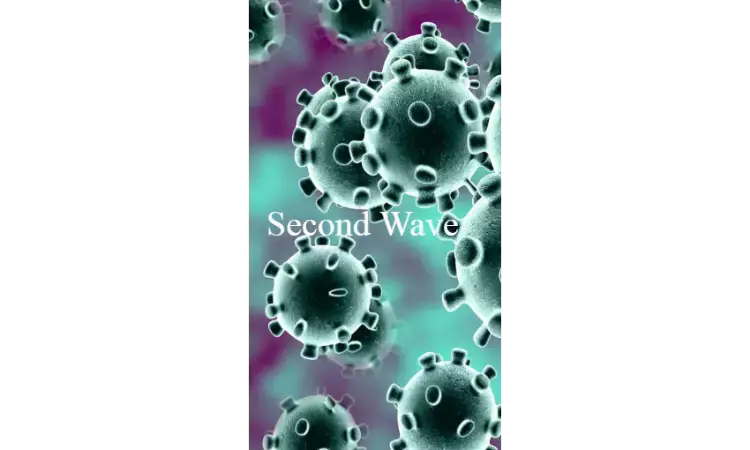- Home
- Medical news & Guidelines
- Anesthesiology
- Cardiology and CTVS
- Critical Care
- Dentistry
- Dermatology
- Diabetes and Endocrinology
- ENT
- Gastroenterology
- Medicine
- Nephrology
- Neurology
- Obstretics-Gynaecology
- Oncology
- Ophthalmology
- Orthopaedics
- Pediatrics-Neonatology
- Psychiatry
- Pulmonology
- Radiology
- Surgery
- Urology
- Laboratory Medicine
- Diet
- Nursing
- Paramedical
- Physiotherapy
- Health news
- Fact Check
- Bone Health Fact Check
- Brain Health Fact Check
- Cancer Related Fact Check
- Child Care Fact Check
- Dental and oral health fact check
- Diabetes and metabolic health fact check
- Diet and Nutrition Fact Check
- Eye and ENT Care Fact Check
- Fitness fact check
- Gut health fact check
- Heart health fact check
- Kidney health fact check
- Medical education fact check
- Men's health fact check
- Respiratory fact check
- Skin and hair care fact check
- Vaccine and Immunization fact check
- Women's health fact check
- AYUSH
- State News
- Andaman and Nicobar Islands
- Andhra Pradesh
- Arunachal Pradesh
- Assam
- Bihar
- Chandigarh
- Chattisgarh
- Dadra and Nagar Haveli
- Daman and Diu
- Delhi
- Goa
- Gujarat
- Haryana
- Himachal Pradesh
- Jammu & Kashmir
- Jharkhand
- Karnataka
- Kerala
- Ladakh
- Lakshadweep
- Madhya Pradesh
- Maharashtra
- Manipur
- Meghalaya
- Mizoram
- Nagaland
- Odisha
- Puducherry
- Punjab
- Rajasthan
- Sikkim
- Tamil Nadu
- Telangana
- Tripura
- Uttar Pradesh
- Uttrakhand
- West Bengal
- Medical Education
- Industry
Guidance for use of monoclonal antibodies in COVID-19 by NIH panel

The National Institutes of Health COVID-19 Treatment Guidelines Panel recommends using one of the following combination anti-SARS-CoV-2 monoclonal antibodies to treat outpatients with mild to moderate COVID-19 who are at high risk of clinical progression.
The statement by the Panel recently highlighted the emergency use authorization of Anti-SARS-CoV-2 monoclonal antibodies for the treatment of COVID-19.
Emergency Use Authorization (EUA) criteria relays on the anti-SARS-CoV-2 monoclonal antibodies and the said combinations: bamlanivimab alone, bamlanivimab plus etesevimab, and casirivimab plus imdevimab.
The recommendations laid out included-
a. One of the following combination anti-SARS-CoV-2 monoclonal antibodies to treat outpatients with mild to moderate COVID-19 who are at high risk of clinical progression, as defined by the Emergency Use Authorization (EUA) criteria (listed in alphabetical order):
a. Bamlanivimab 700 mg plus etesevimab 1,400 mg (AIIa); or
b. Casirivimab 1,200 mg plus imdevimab 1,200 mg (AIIa).
b. Treatment should be started as soon as possible after the patient receives a positive result on a SARS-CoV-2 antigen or nucleic acid amplification test (NAAT) and within 10 days of symptom onset.
c. There are no comparative data to determine whether there are differences in clinical efficacy or safety between bamlanivimab plus etesevimab and casirivimab plus imdevimab.
d. There are SARS-CoV-2 variants, particularly those that contain the mutation E484K (see below), that reduce the virus' susceptibility to bamlanivimab and, to a lesser extent, casirivimab and etesevimab in vitro; however, the clinical impact of these mutations is not known.
e. In regions where SARS-CoV-2 variants with reduced in vitro susceptibility to bamlanivimab plus etesevimab are common, some Panel members would preferentially use casirivimab plus imdevimab while acknowledging that it is not known whether in vitro susceptibility data correlate with clinical outcomes.
f. Because clinical outcome data are limited and there are concerns regarding decreased susceptibility of variants, the Panel recommends against the use of bamlanivimab monotherapy (AIII).
g. If combination products are not available, the use of bamlanivimab monotherapy can be considered for people who meet the EUA criteria on a case-by-case basis.
h. The Panel recommends against the use of anti-SARS-CoV-2 monoclonal antibodies for patients who are hospitalized because of COVID-19, except in a clinical trial (AIIa). However, their use should be considered for persons with mild to moderate COVID-19 who are hospitalized for a reason other than COVID-19 but who otherwise meet the EUA criteria.
The FDA EUAs for all available anti-SARS-CoV-2 monoclonal antibodies and combinations have the same criteria for use wherein they allow for the use of the monoclonal antibodies for the treatment of COVID-19 in nonhospitalized adults and children aged ≥12 years and weighing ≥40 kg who are at high risk for progressing to severe COVID-19 and/or hospitalization.
Dr. Nandita Mohan is a practicing pediatric dentist with more than 5 years of clinical work experience. Along with this, she is equally interested in keeping herself up to date about the latest developments in the field of medicine and dentistry which is the driving force for her to be in association with Medical Dialogues. She also has her name attached with many publications; both national and international. She has pursued her BDS from Rajiv Gandhi University of Health Sciences, Bangalore and later went to enter her dream specialty (MDS) in the Department of Pedodontics and Preventive Dentistry from Pt. B.D. Sharma University of Health Sciences. Through all the years of experience, her core interest in learning something new has never stopped. She can be contacted at editorial@medicaldialogues.in. Contact no. 011-43720751
Dr Kamal Kant Kohli-MBBS, DTCD- a chest specialist with more than 30 years of practice and a flair for writing clinical articles, Dr Kamal Kant Kohli joined Medical Dialogues as a Chief Editor of Medical News. Besides writing articles, as an editor, he proofreads and verifies all the medical content published on Medical Dialogues including those coming from journals, studies,medical conferences,guidelines etc. Email: drkohli@medicaldialogues.in. Contact no. 011-43720751


